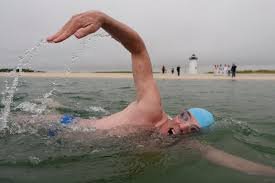In a remarkable feat of endurance and advocacy, United Nations Patron of the Oceans, Lewis Pugh, became the first person to swim around the island of Martha’s Vineyard. The 60-mile swim, completed over 12 grueling days, was timed to coincide with the 50th anniversary of the iconic film Jaws, which was filmed on the island. Pugh used this achievement to draw attention to the urgent plight of the global shark population, which faces catastrophic declines.
Pugh described the experience as one of the most challenging swims of his career, a significant statement coming from someone who was also the first to swim across the North Pole. Speaking about the swim, he explained, “The winds were relentless, creating waves and cold conditions with water temperatures just above 50 degrees. Beyond the physical challenge, there was the mental strain of swimming in waters known to be a global hotspot for great white sharks during migration season.”
Although Pugh didn’t encounter any sharks during the swim, he acknowledged the psychological challenge of knowing they were likely nearby. “Cape Cod has become a global hotspot for great white sharks, which is fantastic for the ecosystem, but mentally exhausting when you’re in the water day after day,” he said.
Raising Awareness for a Global Crisis
Pugh’s mission was not just about pushing human endurance but also shining a spotlight on the alarming decline of sharks worldwide. Over the past 50 years, the global shark population has plummeted by 70%, primarily due to commercial fishing practices. “Globally, an estimated 274,000 sharks are killed every day,” Pugh stated. “That’s over 100 million sharks every year. It’s hard to comprehend the scale of this destruction, but it amounts to nothing less than ecocide.”
Sharks play a critical role as apex predators in maintaining the balance of marine ecosystems. Without them, the oceans risk becoming barren “watery deserts.” Pugh stressed the importance of education and respect for these creatures, which have existed since before the dinosaurs and survived five mass extinctions. “In our lifetime, however, they are under severe threat, and we must act now to protect them,” he added.
Spielberg and the Legacy of Jaws
Even Steven Spielberg, director of Jaws, has expressed guilt over the film’s portrayal of sharks as dangerous villains, a depiction that Pugh believes contributed to negative perceptions and increased commercial fishing. Pugh called for a shift in public understanding, emphasizing that sharks are not “cold-blooded villains” but vital to oceanic life.
A Call for Global Action
Pugh’s message is clear: protecting sharks requires global cooperation. He advocates for international protections, as no single nation can tackle this crisis alone. “We need a unified effort to safeguard these magnificent creatures and preserve the balance of our oceans,” Pugh declared.
Next on Pugh’s agenda is an ocean conservation conference in Nice, where he will join heads of state and environment ministers to discuss strategies for protecting marine life.
Pugh’s incredible swim and impassioned advocacy serve as a call to action for governments, conservationists, and the global public to prioritize shark conservation and ensure the survival of one of the planet’s most ancient and essential species.

